Hispanic Heritage Month takes place every year from September 15 through October 15 as a time to celebrate the diverse cultures, contributions and extensive histories of those of Hispanic and Latino descent.
As the nation celebrates, it is key to recognize that the Hispanic community faces a number of disparities when it comes to accessing healthcare that can limit the overall health and well-being of both themselves and their families. Uninsured rates, underlying social and economic inequities, and linguistic barriers are all contributing challenges that lead to difficulty in accessing healthcare. In 2022, CommUnityCare provided services to 129,000 patients and of those patients 73% identified as Hispanic or Latino. 97% of the 129,000 patients fall at or below 200% of the federal poverty line and 47% of patients noted they were uninsured.
The 2023 theme for Hispanic Heritage Month is “Todos Somos, Somos Uno: We Are All, We Are One”. Join CommUnityCare Health Centers as we recognize the Hispanic voices and experiences of the employees who embody the 2023 theme and are dedicated to the mission of strengthening the health and well-being of the communities we serve here in Travis County and surrounding areas.
Ana Gomez-Rubio – Physician Assistant, Pediatrics
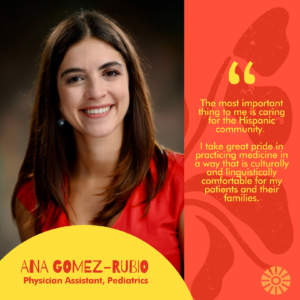 “The most important thing to me is caring for the Hispanic community. I take great pride in practicing medicine in a way that is culturally and linguistically comfortable for my patients and their families,” said CommUnityCare Pediatric Physician Assistant, Anna Gomez-Rubio.
“The most important thing to me is caring for the Hispanic community. I take great pride in practicing medicine in a way that is culturally and linguistically comfortable for my patients and their families,” said CommUnityCare Pediatric Physician Assistant, Anna Gomez-Rubio.
As a Hispanic woman, Gomez-Rubio understands the complexities that come with feeling comfortable while adapting to a new environment. At the age of 17, Gomez-Rubio came to the United States after spending her childhood being raised in Bogota, Colombia, Costa Rica and Brazil. She has since called Texas home.
“Moving so often as a child made me an expert in adapting to change, but also made me feel like I never truly belonged somewhere. Even today, if I am in America, I feel too Colombian, but if I am in Colombia, I feel too American,” expressed Gomez-Rubio. “It’s a feeling I share, and talk about, with a lot of my teenage patients. I want them to know that it’s normal. Through these discussions I can remind them – and myself- that community is not the place; it is the people.”
Since the fall of 2022, when Gomez began her work with CommUnityCare Health Centers she has strived to make an impact in the daily lives of her patients. Gomez also shares her immense dedication to educating children and their families on healthy habits to improve the quality of life for the Hispanic community – one patient at a time.
“I am fortunate to represent a small population of female Hispanic Physician Assistants and have the opportunity to be a role model every day,” said Gomez-Rubio.
Michael Campos – Primary Care Behavioral Health Supervisor
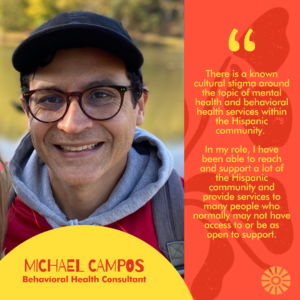 Michael Campos, CommUnityCare Behavioral Health Consultant, knows first-hand the experiences and challenges that the majority of CommUnityCare patients face. Campos was born and raised in Texas in a Spanish-speaking, low-income and underinsured household – a reflection of most patients who walk through the doors of CommUnityCare Health Centers each and every day. His parents immigrated to the United States from El Salvador in the early 1980s.
Michael Campos, CommUnityCare Behavioral Health Consultant, knows first-hand the experiences and challenges that the majority of CommUnityCare patients face. Campos was born and raised in Texas in a Spanish-speaking, low-income and underinsured household – a reflection of most patients who walk through the doors of CommUnityCare Health Centers each and every day. His parents immigrated to the United States from El Salvador in the early 1980s.
“I was the first member in my immediate family to graduate from college, receiving a Bachelor of Social Work (BSW) and a Master of Social Work (MSW),” said Campos. “In college, I realized I wanted to go into a career that involved working with people who grew up or are currently living in similar situations to what I did. I chose social work as a profession so I could help empower lives and communities, especially the Hispanic community.”
Campos first came to CommUnityCare Health Centers in February 2016, sharing his appreciation for the team-based work environment with people who care for our patients, each other, and the mission.
“There is a known cultural stigma around the topic of mental health and behavioral health services within the Hispanic community,” said Campos. “In my role as a Behavioral Health Consultant (BHC), I have been able to reach and support a lot of the Hispanic community and provide services to many people who normally may not have access to or be as open to support.”
Yvonne Camarena – Chief Nursing Officer
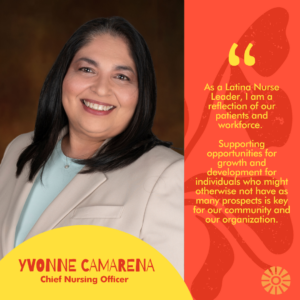 “I was fortunate to have the most incredible role model, my mother,” said CommUnityCare Chief Nursing Officer, Yvonne Camarena. “My mother was creating her own environment of opportunity where there were limited options for Latina women.”
“I was fortunate to have the most incredible role model, my mother,” said CommUnityCare Chief Nursing Officer, Yvonne Camarena. “My mother was creating her own environment of opportunity where there were limited options for Latina women.”
As a second-generation nurse, following in her mother’s footsteps, Camarena carries the principles her mother taught her in the daily work she does at CommUnityCare Health Centers.
Yvonne Camarena served as Chief Operating Officer for CommUnityCare Health Centers until August of 2022 transitioning to the Chief Nursing Officer role. Yvonne areas of responsibility include Nursing Services, Referral Management, Population Health Management Programs, Care Management and Community Health Workers services, Value Base Care initiatives, Infection Prevention, Laboratory Services and Health Information Management services.
“Regardless of the adversity she [my mother] faced, she instilled in her children the value of demonstrating the pride of a Latina personal identity, a strong work ethic, kindness for individuals who traditionally have not received respect, and not fearing doing what is best for your community,” added Camarena.
After nearly 16 years of calling CommUnityCare Health Centers home, Camarena’s dedication to the community and workforce has not faltered.
“As a Latina Nurse Leader, I am a reflection of our patients and workforce,” said Camarena. “Supporting opportunities for growth and development for individuals who might otherwise not have as many prospects is key for our community and organization.”
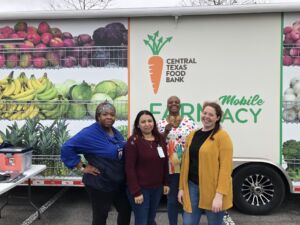 CommUnityCare Health Centers is proud to partner with the Central Texas Food Bank Mobile FARMacy program. The FARMacy program makes it possible for healthcare providers at CommUnityCare Health Centers to ‘prescribe’ nutritious food. Patients are able to access a mobile FARMacy pantry while accessing medical care at a CommUnityCare Health Center location and easily shop for nutritious food that meets USDA MyPlate standards.
CommUnityCare Health Centers is proud to partner with the Central Texas Food Bank Mobile FARMacy program. The FARMacy program makes it possible for healthcare providers at CommUnityCare Health Centers to ‘prescribe’ nutritious food. Patients are able to access a mobile FARMacy pantry while accessing medical care at a CommUnityCare Health Center location and easily shop for nutritious food that meets USDA MyPlate standards. 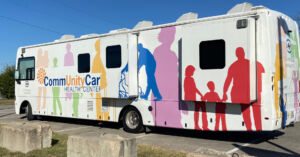 CommUnityCare Health Centers and Central Health have long recognized the need to expand health care delivery to the Eastern Crescent in Travis County. As part of this ongoing effort, CommUnityCare Health Centers will transition its in-person medical mobile services
CommUnityCare Health Centers and Central Health have long recognized the need to expand health care delivery to the Eastern Crescent in Travis County. As part of this ongoing effort, CommUnityCare Health Centers will transition its in-person medical mobile services 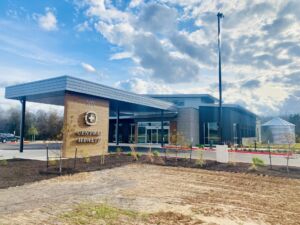 CommUnityCare services at the mobile clinic and a temporary modular clinic in Hornsby Bend have served as a bridge while plans for new Eastern Crescent clinics were developed. Eastern Travis County celebrated the opening of the new Central Health Hornsby Bend Health and Wellness Center in Fall 2023. In December 2023, CommUnityCare Health Centers began providing patients in Hornsby Bend with family medicine, women’s health and lab services three days a week and has experienced a strong patient demand since opening. The Del Valle Health and Wellness Center is also expected to open in late 2024.
CommUnityCare services at the mobile clinic and a temporary modular clinic in Hornsby Bend have served as a bridge while plans for new Eastern Crescent clinics were developed. Eastern Travis County celebrated the opening of the new Central Health Hornsby Bend Health and Wellness Center in Fall 2023. In December 2023, CommUnityCare Health Centers began providing patients in Hornsby Bend with family medicine, women’s health and lab services three days a week and has experienced a strong patient demand since opening. The Del Valle Health and Wellness Center is also expected to open in late 2024. 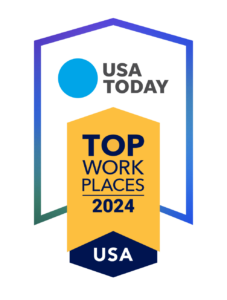 “This recognition is a testament to the dedication and talent of our team members, who make our organization such a special place to work. We are committed to creating a positive and inclusive workplace culture where everyone can thrive, and this award is a validation of our efforts,” said CommUnityCare Vice President of Human Resources, Yomi Fabiyi. ”I look forward to continuing our journey of excellence and further enhancing our workplace for the benefit of all our employees and patients who we serve every day.”
“This recognition is a testament to the dedication and talent of our team members, who make our organization such a special place to work. We are committed to creating a positive and inclusive workplace culture where everyone can thrive, and this award is a validation of our efforts,” said CommUnityCare Vice President of Human Resources, Yomi Fabiyi. ”I look forward to continuing our journey of excellence and further enhancing our workplace for the benefit of all our employees and patients who we serve every day.”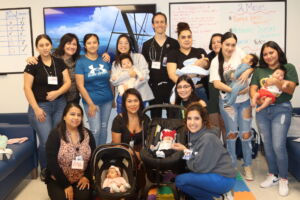 “It’s really an incredible model, you’re drawing out of the parent and empowering them to harness what they already know and key into that maternal or parental instinct,” said Dr. Michelle Gallas, Pediatrician at CommUnityCare Health Centers. “So, the idea is that families form a community inside of the medical home.”
“It’s really an incredible model, you’re drawing out of the parent and empowering them to harness what they already know and key into that maternal or parental instinct,” said Dr. Michelle Gallas, Pediatrician at CommUnityCare Health Centers. “So, the idea is that families form a community inside of the medical home.”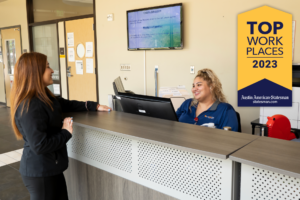 Austin, TX –
Austin, TX –  “The most important thing to me is caring for the Hispanic community. I take great pride in practicing medicine in a way that is culturally and linguistically comfortable for my patients and their families,” said CommUnityCare Pediatric Physician Assistant, Anna Gomez-Rubio.
“The most important thing to me is caring for the Hispanic community. I take great pride in practicing medicine in a way that is culturally and linguistically comfortable for my patients and their families,” said CommUnityCare Pediatric Physician Assistant, Anna Gomez-Rubio. Michael Campos, CommUnityCare Behavioral Health Consultant, knows first-hand the experiences and challenges that the majority of CommUnityCare patients face. Campos was born and raised in Texas in a Spanish-speaking, low-income and underinsured household – a reflection of most patients who walk through the doors of CommUnityCare Health Centers each and every day. His parents immigrated to the United States from El Salvador in the early 1980s.
Michael Campos, CommUnityCare Behavioral Health Consultant, knows first-hand the experiences and challenges that the majority of CommUnityCare patients face. Campos was born and raised in Texas in a Spanish-speaking, low-income and underinsured household – a reflection of most patients who walk through the doors of CommUnityCare Health Centers each and every day. His parents immigrated to the United States from El Salvador in the early 1980s. “I was fortunate to have the most incredible role model, my mother,” said CommUnityCare Chief Nursing Officer, Yvonne Camarena. “My mother was creating her own environment of opportunity where there were limited options for Latina women.”
“I was fortunate to have the most incredible role model, my mother,” said CommUnityCare Chief Nursing Officer, Yvonne Camarena. “My mother was creating her own environment of opportunity where there were limited options for Latina women.”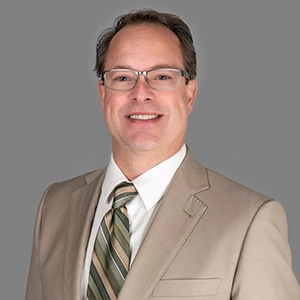 Jaeson T. Fournier, D.C., MPH, is the chief executive officer of the CommUnityCare Health Centers, which operates 28 community health centers in Central Texas, serving more than 129,000 individuals. He also serves on the board of the Texas Association of Community Health Centers.
Jaeson T. Fournier, D.C., MPH, is the chief executive officer of the CommUnityCare Health Centers, which operates 28 community health centers in Central Texas, serving more than 129,000 individuals. He also serves on the board of the Texas Association of Community Health Centers.
 CommUnityCare Health Centers provides equitable access to dental care for Central Texans through its eight dental clinics.
CommUnityCare Health Centers provides equitable access to dental care for Central Texans through its eight dental clinics.